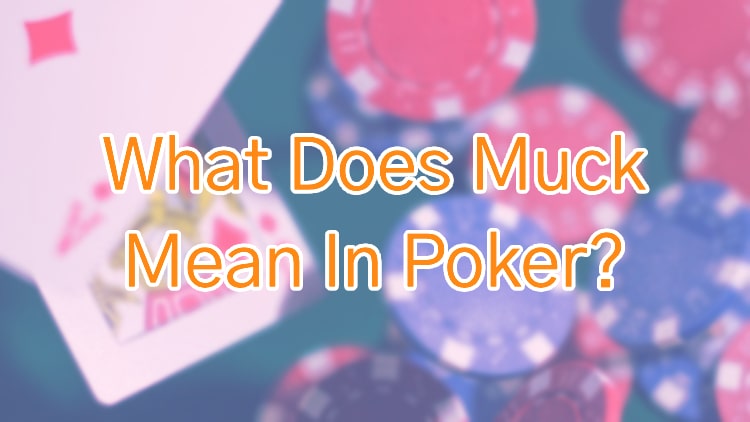
If you've ever played poker, you may have heard the term "muck" thrown around. But what does it actually mean?
In simple terms, mucking in poker refers to the act of discarding your cards without showing them to your opponents. This usually happens when you decide to fold your hand or after a showdown if you do not have the winning hand.
Understanding when and why players muck their cards can add a new layer of strategy to your game. It helps you avoid giving away too much information to other players.
With this blog post, we aim to help you get a grasp of this commonly used term and understand its importance in poker.
Muck In Poker Meaning
Mucking in poker is all about discarding your cards during the game. If you fold, you place your cards face-down into the muck pile. This pile is where all the discarded cards go.
You can also muck your cards at the end of a hand, specifically after a showdown, if you don't have the winning hand. By doing this, you are avoiding showing your cards to everyone at the table.
Mucking helps keep your playing style a bit of a mystery. Other players won't know what cards you had, making it harder for them to guess your strategy or track your habits.
It's also a way to protect yourself from giving away any tells. Tells are small clues that can give away the strength or weakness of your hand. By mucking, you limit the information your opponents can gather about you.
Remember, though, that mucking is not always allowed in every situation. Some poker variations and house rules require you to show your cards. Always be sure to know the rules of the game you're playing.
When Can You Muck Your Cards In Poker?
Knowing when you can muck your cards in poker is crucial for playing the game effectively.
Folding Your Hand
The most common time to muck your cards is when you decide to fold. If you fold, you are opting out of the current hand, and you place your cards face-down into the muck pile. This indicates you are no longer in contention for the pot.
After a Showdown
Another scenario where you can muck your cards is during a showdown. If you've reached the end of a hand and realise you don't have the winning hand, you can choose to muck your cards instead of revealing them. This helps maintain an element of surprise for future hands, as no one knows what the cards in play are.
Check the House Rules
It's important to note that some poker games and casinos have specific rules about when you can muck your cards. For instance, certain house rules might require all players to show their cards at a showdown. Always make sure to understand the rules of the game you're playing.
Mucking your cards can occur either when you fold or during a showdown if you don't have the winning hand. Being aware of the timing and rules around mucking can help you play a more strategic game.
What Is The Difference Between Fold & Muck?
Understanding the difference between folding and mucking is essential for any poker player.
If you fold, you decide to exit the current hand. This means you place your cards face-down on the table and surrender any chance of winning the pot. Folding is usually done when you believe your cards are not strong enough to compete against other players' hands.
Mucking, on the other hand, involves discarding your cards as well, but it's a broader term. While you do muck your cards when you fold, mucking can also occur at a showdown. If you reach the end of a hand and realise you don't have the best hand, you can muck your cards to keep them hidden.
The key difference is that folding is a specific action taken during the betting rounds to exit the hand. Mucking is the act of discarding your cards without revealing them, and it can happen when you fold or at the showdown.
In short, folding is a type of mucking that occurs during the game to drop out of the hand. Mucking covers both folding and discarding your cards at the end of a hand without revealing them.
Why Would You Muck In Poker?
Protect Your Strategy
One of the main reasons to muck your cards is to keep your playing strategy hidden. By not showing your cards, you prevent your opponents from gaining insights into your decision-making process.
Avoid Giving Tells
Another important reason to muck your cards is to avoid giving away any tells. Tells are small clues that can reveal the strength or weakness of your hand. Mucking helps you maintain a poker face and keep other players guessing.
Speed Up the Game
Mucking can also help speed up the game. If you fold your cards without showing them, the play moves along more quickly. This is beneficial in live games, where the pace can sometimes slow down.
Keep Your Focus
Finally, mucking can help you to stay focused on the game. By discarding your cards and moving on, you can concentrate on the next hand and think about your strategy without dwelling on past decisions.
In summary, mucking your cards serves multiple purposes, from protecting your strategy and avoiding tells to speeding up the game and keeping your focus. It has its place, but it is also not always available, so be sure to read through the rules of the specific poker game you are looking at playing - and, as always, please gamble responsibly.
